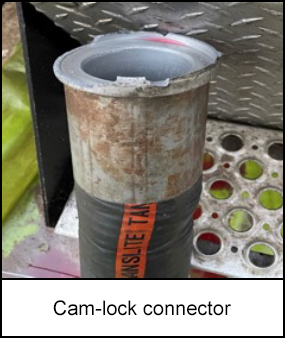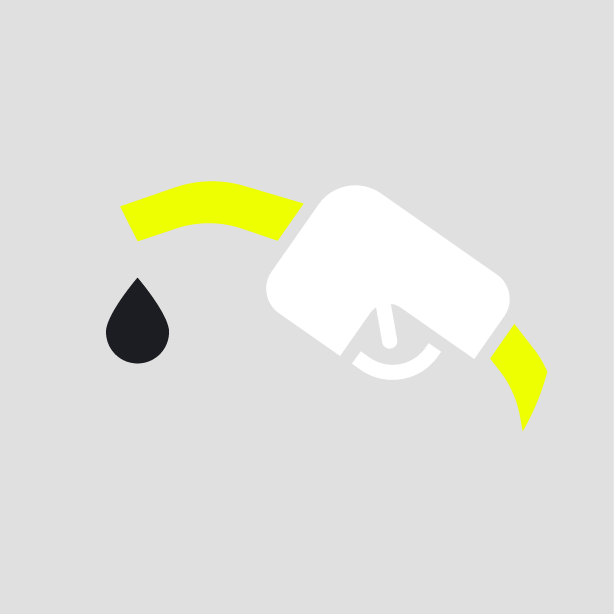-
What happened?
While attempting to transfer fuel, a cam-lock connection failed and injured a contract worker.
The failed connection struck the worker’s hard hat.
They were also impacted by the energy release.
The job was suspended, and the worker was taken to a medical facility for evaluation.

-
Why did it happen?
When the pump was engaged, a misaligned valve directed the fuel to a closed ball valve. The transfer hose became over-pressured causing a cam-lock connection to fail.
The fuel offload procedure was not used / understood. The valve alignment was not verified before start-up.
A ‘walk the line’ check was not conducted. A job safety analysis (JSA) and product transfer sheet were not completed.
The hose was not rated for maximum system pressure. Function tests for pressure relief devices (PRDs) did not exist.
The worker was positioned near the energised line. An exclusion zone was not established.

-
What did they learn?
Review the preventative maintenance program to ensure function tests for pressure relief devices are conducted, and that hoses are adequately rated and tested.
Confirm that personnel know and use fluid transfer procedures.
Ensure exclusion zones are established when conducting fluid transfers.
Promote awareness and understanding of process safety fundamentals.

-
Ask yourself or your crew
Do you identify hazards prior to conducting fluid transfers? Do you identify and avoid line of fire hazards?
Do you know the correct fluid transfer procedures? Do you follow them?
Do you ‘walk the line’ and verify valve alignment prior to starting fluid transfers?
How do you verify that hoses are rated for the operating pressure? How do you verify that hoses have been tested and that pressure relief devices are working?

Add to homescreen
Content name
Select existing category:
Content name
New collection
Edit collection
What happened?
While attempting to transfer fuel, a cam-lock connection failed and injured a contract worker.
The failed connection struck the worker’s hard hat.
They were also impacted by the energy release.
The job was suspended, and the worker was taken to a medical facility for evaluation.

Why did it happen?
When the pump was engaged, a misaligned valve directed the fuel to a closed ball valve. The transfer hose became over-pressured causing a cam-lock connection to fail.
The fuel offload procedure was not used / understood. The valve alignment was not verified before start-up.
A ‘walk the line’ check was not conducted. A job safety analysis (JSA) and product transfer sheet were not completed.
The hose was not rated for maximum system pressure. Function tests for pressure relief devices (PRDs) did not exist.
The worker was positioned near the energised line. An exclusion zone was not established.
What did they learn?
Review the preventative maintenance program to ensure function tests for pressure relief devices are conducted, and that hoses are adequately rated and tested.
Confirm that personnel know and use fluid transfer procedures.
Ensure exclusion zones are established when conducting fluid transfers.
Promote awareness and understanding of process safety fundamentals.
Ask yourself or your crew
Do you identify hazards prior to conducting fluid transfers? Do you identify and avoid line of fire hazards?
Do you know the correct fluid transfer procedures? Do you follow them?
Do you ‘walk the line’ and verify valve alignment prior to starting fluid transfers?
How do you verify that hoses are rated for the operating pressure? How do you verify that hoses have been tested and that pressure relief devices are working?
During a fuel transfer, a cam-lock connection failed due to over-pressurisation, injuring a worker. The incident was caused by a misaligned valve and procedural oversights, leading to the suspension of the job and the worker being taken for medical evaluation.
Original material courtesy of Safer Together (Australia)
To access the PDF and PowerPoint versions, please visit https://www.safertogether.com.au/resources/sharing-library/working-with-near-pressurised-systems-learning-event-bulletin













